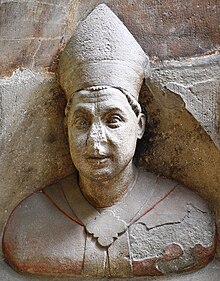Jan of Jenštejn
You can help expand this article with text translated from the corresponding article in Czech. (October 2023) Click [show] for important translation instructions.
|

Jan z Jenštejna
Life and career
Born in 1348 in Prague,
While on his castle, he fell from a newly built tower and miraculously managed to grab hold of something before falling to the ground.
He died in Rome on 17 June 1400,[1] and all his possessions, including his castle, passed to the Archbishops of Prague.
Artistic works
His musical works were compiled in the book Die Hymnen Johanns von Jenstein, Erzbischofs von Prag of Q. M. Dreves.[1] The book was published in German in 1886.[1] His literary activity was very rich and includes not only religious and philosophical works, but also poems.
References
Notes
Citations
Sources
- Vlhová-Wörner, Hana (2018). "Jan z Jenštejna". ISBN 9781561592630. (subscription or UK public library membershiprequired)
Further reading
- Boehm, Barbara Drake; Fajt, Jiri (2005). Prague: The Crown of Bohemia, 1347-1437. New York: The Metropolitan Museum of Art. ISBN 1588391612.
- Weltsch, Ruben Ernest (1968) Archbishop John of Jenstein (1348–1400): papalism, humanism and reform in pre-Hussite Prague Mouton, The Hague, OCLC 963607
- Wratislaw, Albert Henry(1878) "John of Jenstein, archbishop of Prague, 1378-1397" Transactions of the Royal Historical Society 7: pp. 30–57
- Kopecký, Milan (1999) Jan Milíč z Kroměříže a Jan z Jenštejna Cisterciana Sarensis, Žďár nad Sázavou, OCLC 44149277, in Czech
- Bitnar, Vilém (1938) Jan z Jenštejna: Mariánský a eucharistický horlitel české gotiky Vítězové, profesoři bohosloveckého učiliště řádu dominikánského, Olomouc, OCLC 85601162 in Czech
- Holinka, Rudolf (1933) Církevní politika arcibiskupa Jana z Jenštejna za pontifikátu Urbana VI: Studie z dĕjin velikého schismatu zapadního University Komenskeho, Bratislava, OCLC 19047598 in Czech
